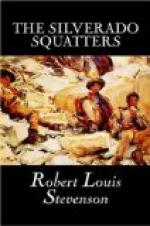The western door—that which looked up the canyon, and through which we entered by our bridge of flying plank—was still entire, a handsome, panelled door, the most finished piece of carpentry in Silverado. And the two lowest bunks next to this we roughly filled with hay for that night’s use. Through the opposite, or eastern-looking gable, with its open door and window, a faint, disused starshine came into the room like mist; and when we were once in bed, we lay, awaiting sleep, in a haunted, incomplete obscurity. At first the silence of the night was utter. Then a high wind began in the distance among the tree-tops, and for hours continued to grow higher. It seemed to me much such a wind as we had found on our visit; yet here in our open chamber we were fanned only by gentle and refreshing draughts, so deep was the canyon, so close our house was planted under the overhanging rock.
THE HUNTER’S FAMILY
There is quite a large race or class of people in America, for whom we scarcely seem to have a parallel in England. Of pure white blood, they are unknown or unrecognizable in towns; inhabit the fringe of settlements and the deep, quiet places of the country; rebellious to all labour, and pettily thievish, like the English gipsies; rustically ignorant, but with a touch of wood-lore and the dexterity of the savage. Whence they came is a moot point. At the time of the war, they poured north in crowds to escape the conscription; lived during summer on fruits, wild animals, and petty theft; and at the approach of winter, when these supplies failed, built great fires in the forest, and there died stoically by starvation. They are widely scattered, however, and easily recognized. Loutish, but not ill-looking, they will sit all day, swinging their legs on a field fence, the mind seemingly as devoid of all reflection as a Suffolk peasant’s, careless of politics, for the most part incapable of reading, but with a rebellious vanity and a strong sense of independence. Hunting is their most congenial business, or, if the occasion offers, a little amateur detection. In tracking a criminal, following a particular horse along a beaten highway, and drawing inductions from a hair or a footprint, one of those somnolent, grinning Hodges will suddenly display activity of body and finesse of mind. By their names ye may know them, the women figuring as Loveina, Larsenia, Serena, Leanna, Orreana; the men answering to Alvin, Alva, or Orion, pronounced Orrion, with the accent on the first. Whether they are indeed a race, or whether this is the form of degeneracy common to all back-woodsmen, they are at least known by a generic byword, as Poor Whites or Low-downers.




